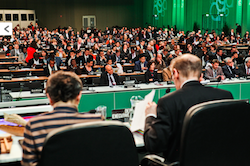According to the World Energy Outlook fossil fuel consumption subsidies have reached $544 billion in 2012, up from $523 billion in 2011. This news has caused the Global Renewable Fuels Alliance (GRFA) to criticize leaders of the most developed nations for failing to reduce fossil fuel subsidies despite their commitment to eliminate them four years ago.
This weekend marked the end of this year’s United Climate Change Conference and Bliss Baker, GRFA spokesperson said “Another year has passed without any progress being made in eliminating these wasteful crude oil subsidies. These market distorting subsidies hurt developing economies and slow the development of alternative fuels, like biofuels.”
 In 2009, at the Pittsburgh G20 Summit, the world’s most developed countries committed to eliminating unnecessary fossil fuel subsidies. Back in 2009, fossil fuel subsidies had reached $300 billion, 45 percent less than where they are today.
In 2009, at the Pittsburgh G20 Summit, the world’s most developed countries committed to eliminating unnecessary fossil fuel subsidies. Back in 2009, fossil fuel subsidies had reached $300 billion, 45 percent less than where they are today.
This year’s figure of $544 billion in fossil fuel consumption subsidies shows that efforts to reduce them are not working says Baker. Even more egregious is the fact that this number does not include the production subsidies governments provide directly to crude oil companies, which is widely accepted to be in excess of $100 billion he adds.
“The GRFA finds it worrying that although we seem to be very aware of climate change, the leaders of the world’s most important nations have not slowed the subsidization of the consumption and production of crude oil in four years,” said Baker.
This year’s United Nations Climate Change Conference featured a “Transport Day” and “Fossil-Fuel Subsidies and Climate Change” side events. The focus of these events was land transport and fossil fuel subsidy reform. Land transport, according to the International Energy Agency (EIA), is the fastest growing source of carbon dioxide emissions, contributing 13 percent of global emissions. Eliminating fossil fuel subsidies could further reduce global emissions by a minimum of 10 percent.
“It is disturbing that no progress on the sources of over 20% of the world’s carbon emissions was made and that land transport and fossil fuels subsidies were reduced to side events at the premier conference established to determine the best ways of combating climate change,” added Baker.
He concluded, “This year’s Warsaw Climate Conference is another lost opportunity for leaders of the most developed nations to show some leadership and get serious about cutting subsidies to crude oil and increase biofuels share of the global future energy mix.”

